| Listing 1 - 10 of 11 | << page >> |
Sort by
|
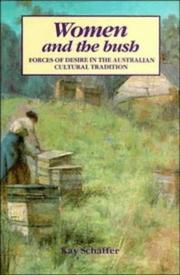
ISBN: 0521368162 052136244X 0511552114 Year: 1990 Publisher: Cambridge New York Sydney Cambridge University Press
Abstract | Keywords | Export | Availability | Bookmark
 Loading...
Loading...Choose an application
- Reference Manager
- EndNote
- RefWorks (Direct export to RefWorks)
Images of Australian identity, and of Australian nationhood, are social and cultural constructs. There are several dominant themes and elements, one of the most pervasive being the Australian bushman confronting a vast and barren landscape. This is a specifically Australian conception of the battle between Man and Nature. Throughout the myths, traditions and literary creations of Australia are underlying assumptions about gender and sexual difference: assumptions about masculinity and femininity within the nationalist tradition, which affect perceptions today. In this new critique, Kay Schaffer applies the insights of feminist scholarship and of literary analysis to examine the national character. She looks at how the concept of 'the typical Australian', and the woman who stands in relation to him, has evolved across a range of cultural forms, including historical and literary texts, film and the media. She concentrates in particular on the writings of Henry Lawson and of Barbara Bayton. The circulation of ideas about these writers, their contribution to a national mythology, and the different ways their importance has been represented to modern readers, is explored and discussed. This thoughtful and provocative study will interest readers concerned with Australian literary and cultural history, as well as the broader questions of Australia's changing self-image. It will be of particular value to those interested in feminist approaches to culture and society.
Australian literature --- History and criticism --- Women in literature --- Women and literature --- Australia --- Civilization --- Frontier and pioneer life --- Sex role --- Australian literature - History and criticism. --- Women in literature. --- Women and literature - Australia. --- National characteristics, Australian. --- Australia - Civilization. --- Frontier and pioneer life in literature. --- Frontier and pioneer life - Australia. --- Sex role in literature. --- Sex role - Australia. --- Arts, Australian. --- Arts and Humanities --- Literature --- History and criticism. --- Civilization. --- Australian arts --- Gender role --- Gender roles --- Gendered role --- Gendered roles --- Role, Gender --- Role, Gendered --- Role, Sex --- Roles, Gender --- Roles, Gendered --- Roles, Sex --- Sex roles --- Sex (Psychology) --- Sex differences (Psychology) --- Social role --- Gender expression --- Sexism --- Australian national characteristics --- Woman (Christian theology) in literature --- Women in drama --- Women in poetry
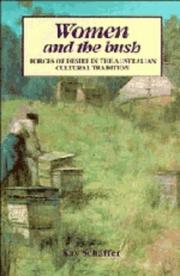
ISBN: 9780511552113 9780521362443 9780521368162 Year: 1989 Publisher: Cambridge Cambridge University Press
Abstract | Keywords | Export | Availability | Bookmark
 Loading...
Loading...Choose an application
- Reference Manager
- EndNote
- RefWorks (Direct export to RefWorks)
Art --- Thematology --- Literature --- Austronesian literature --- Australia
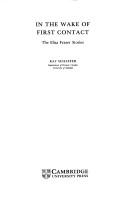
ISBN: 0521495776 Year: 1996 Publisher: Cambridge ; New York, NY : Cambridge University Press,
Abstract | Keywords | Export | Availability | Bookmark
 Loading...
Loading...Choose an application
- Reference Manager
- EndNote
- RefWorks (Direct export to RefWorks)
AUSTRALIAN LITERATURE --- AUSTRALIAN IDENTITY --- FRASER (ELIZA ANNE) --- FRINGE OF LEAVES, A --- JOSIPOVICI (GABRIEL) --- AUSTRALIAN NATIONALISM --- LITERATURE AND HISTORY --- AUSTRALIENS ABORIGENES --- ONDAATJE (MICHAEL), 1943 --- -WHITE (PATRICK), 1912-1990 --- AUSTRALIA
Book
ISBN: 9789042037946 9789401210423 9042037946 940121042X 1306454832 9781306454834 Year: 2014 Volume: 173 Publisher: Amsterdam ; New York : Rodopi,
Abstract | Keywords | Export | Availability | Bookmark
 Loading...
Loading...Choose an application
- Reference Manager
- EndNote
- RefWorks (Direct export to RefWorks)
How does one read across cultural boundaries? The multitude of creative texts, performance practices, and artworks produced by Indigenous writers and artists in contemporary Australia calls upon Anglo-European academic readers, viewers, and critics to respond to this critical question. Contributors address a plethora of creative works by Indigenous writers, poets, playwrights, filmmakers, and painters, including Richard Frankland, Lionel Fogarty, Lin Onus, Kim Scott, Sam Watson, and Alexis Wright, as well as Durrudiya song cycles and works by Western Desert artists. The complexity of these creative works transcends categorical boundaries of Western art, aesthetics, and literature, demanding new processes of reading and response. Other contributors address works by non-Indigenous writers and filmmakers such as Stephen Muecke, Katrina Schlunke, Margaret Somerville, and Jeni Thornley, all of whom actively engage in questioning their complicity with the past in order to challenge Western modes of knowledge and understanding and to enter into a more self-critical and authentically ethical dialogue with the Other. In probing the limitations of Anglo-European knowledge-systems, essays in this volume lay the groundwork for entering into a more authentic dialogue with Indigenous writers and critics.
Aboriginal Australians --- Australiens (Aborigènes) --- Cultural assimilation --- Acculturation --- Aboriginals, Australian --- Aborigines, Australian --- Australian aboriginal people --- Australian aboriginals --- Australian aborigines --- Australians, Aboriginal --- Australians, Native (Aboriginal Australians) --- Native Australians (Aboriginal Australians) --- Ethnology --- Indigenous peoples --- Cultural assimilation. --- Arts, Aboriginal Australian. --- Social life and customs. --- Civilization. --- Aboriginal Australian arts --- Arts, Australian aboriginal
Book
ISBN: 9780415682749 9780203799222 9781135091354 9781135091422 9781135091491 9781138643468 1138643467 Year: 2014 Publisher: London : Routledge,
Abstract | Keywords | Export | Availability | Bookmark
 Loading...
Loading...Choose an application
- Reference Manager
- EndNote
- RefWorks (Direct export to RefWorks)
Chinese literature --- Women authors, Chinese --- Women authors --- History and criticism. --- Ecrits de femmes chinoises --- Ecrivaines chinoises --- Littérature chinoise
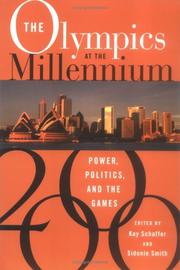
ISBN: 0813528208 Year: 2000 Publisher: New Brunswick (N.J.) : Rutgers university press,
Abstract | Keywords | Export | Availability | Bookmark
 Loading...
Loading...Choose an application
- Reference Manager
- EndNote
- RefWorks (Direct export to RefWorks)
Olympics --- History. --- Social aspects.
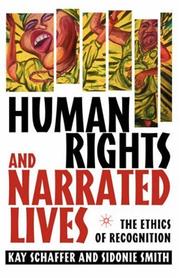
ISBN: 1403964947 1403964955 Year: 2004 Publisher: New York : Palgrave Macmillan,
Abstract | Keywords | Export | Availability | Bookmark
 Loading...
Loading...Choose an application
- Reference Manager
- EndNote
- RefWorks (Direct export to RefWorks)
Personal narratives have become one of the most potent vehicles for advancing human rights claims across the world. 'Human Rights and Narrated Lives' explores what happens when autobiographical narratives are produced, received, and circulated in the field of human rights. It asks how personal narratives emerge in local settings how international rights discourse enables and constrains individual and collective subjectivities in narration how personal narratives circulate and take on new meanings in new contexts and how and under what conditions they feed into, affect, and are affected by the reorganization of politics in post-cold war, postcolonial, globalizing human rights contexts.
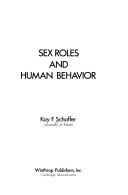
ISBN: 0876268076 Year: 1981 Publisher: Cambridge, Mass. Winthrop Publishers
Abstract | Keywords | Export | Availability | Bookmark
 Loading...
Loading...Choose an application
- Reference Manager
- EndNote
- RefWorks (Direct export to RefWorks)
Mental health --- Gender roles --- Men --- Psychoanalysis --- Psychology --- Sexuality --- Women --- Book
Book
ISBN: 9781403964953 Year: 2004 Publisher: New York Palgrave Macmillan
Abstract | Keywords | Export | Availability | Bookmark
 Loading...
Loading...Choose an application
- Reference Manager
- EndNote
- RefWorks (Direct export to RefWorks)
Personal narratives have become one of the most potent vehicles for advancing human rights claims across the world. This text explores what happens when autobiographical narratives are produced, received and circulated in the field of human rights. Author Schaffer from University of Adelaide, SA.
Book
ISBN: 9780803950092 Year: 1993 Publisher: Newbury Park (Calif.) Sage
Abstract | Keywords | Export | Availability | Bookmark
 Loading...
Loading...Choose an application
- Reference Manager
- EndNote
- RefWorks (Direct export to RefWorks)
| Listing 1 - 10 of 11 | << page >> |
Sort by
|

 Search
Search Feedback
Feedback About UniCat
About UniCat  Help
Help News
News